|
Okay, this might be a dumb question, but what exactly is the difference between Syndicalism and Communism? From what I've been able to Google, Syndicalism is kind of a rule by unions and industries, while communism is the whole 'everyone is equal' shtick. I'm sure there's a lot more nuance to it though.
|
|
|
|

|
| # ? Jun 2, 2024 20:46 |
|
CommissarMega posted:Okay, this might be a dumb question, but what exactly is the difference between Syndicalism and Communism? From what I've been able to Google, Syndicalism is kind of a rule by unions and industries, while communism is the whole 'everyone is equal' shtick. I'm sure there's a lot more nuance to it though. Syndicalism is basically trade union democracy, not exactly communism, not exactly capitalism, rather in between.
|
|
|
|
Easier if you think of Real Existing Socialist States as still being in the transitional stage towards communism (a stateless society), as they all proclaimed themselves to be, and not actually communist - rather in the state capitalist/dictatorship-of-the-proletariat stage before going to True Communism. Syndicalism is just a different type of transitional stage (although obviously some people in these societies would advocate that this transitional stage is just fine as it is).
|
|
|
|
The short version of it is that one of the main creators of the mod was a syndicalist (which historically was a tendency mostly limited to France, Spain, and small groups in Italy, and the French branch got largely wiped out during WW1) and thought it would be cool for socialism to be alt hist/differently named and their pet tendency to be dominant.
|
|
|
|
Ouch, the Pacific States declaring war on the US is usually a death sentence given the massive border the US has to defend with every other front, but the addition of that AND Mexico declaring war makes it a near certainty.
|
|
|
|
RZApublican posted:Ouch, the Pacific States declaring war on the US is usually a death sentence given the massive border the US has to defend with every other front, but the addition of that AND Mexico declaring war makes it a near certainty. Are you implying there was any doubt that the Proletariat would be unable to destroy the decadent Bourgeoisie and free their oppressed brothers and sisters? Perhaps you are in need of re-education in the values of Syndicalism.
|
|
|
|
Mycroft Holmes posted:Syndicalism is basically trade union democracy, not exactly communism, not exactly capitalism, rather in between. So trade industries and unions have the vote instead of individuals? I have to admit, that does sound enticing.
|
|
|
CommissarMega posted:So trade industries and unions have the vote instead of individuals? I have to admit, that does sound enticing. I think the gist is that trade unions under syndicalism are (supposed to be) run fairly democratically, and then those elected trade union leaders come together with each other to form a government. There are just about as many different types of socialism as there are socialists though, and we on the left are infamous for eating our own, so I fully expect someone to come along and tell me I'm wrong there.
|
|
|
|
|
Chapter Three: Snowbirds (December 1936) This update is in three sections. I separated the war updates into two fronts for clarity and there is the newspaper at the end for other events. Each of the two front sections occurred simultaneously Virginia 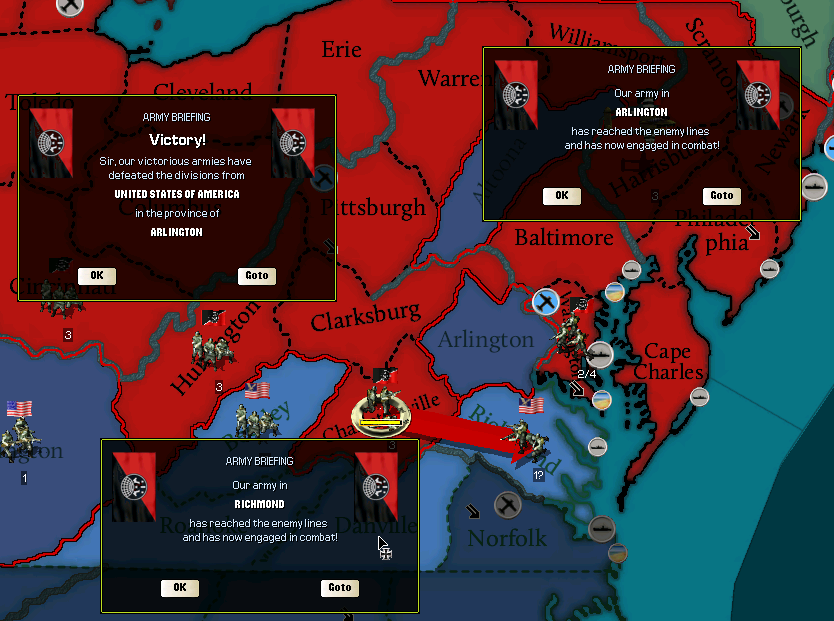 The Canadian volunteer unit that was evicted from Washington fled across the Potomac to Arlington, where they were trapped between Marshall in Washington, Rose in Charlottesville and Union State forces in Richmond. Cut off from supply and unable to reorganize or escape, they had no choice but to surrender to the Benjamin Franklin Corps, eliminating the federal presence in Virginia. Now the Virginia front could turn its attention to the more robust Union State opposition. 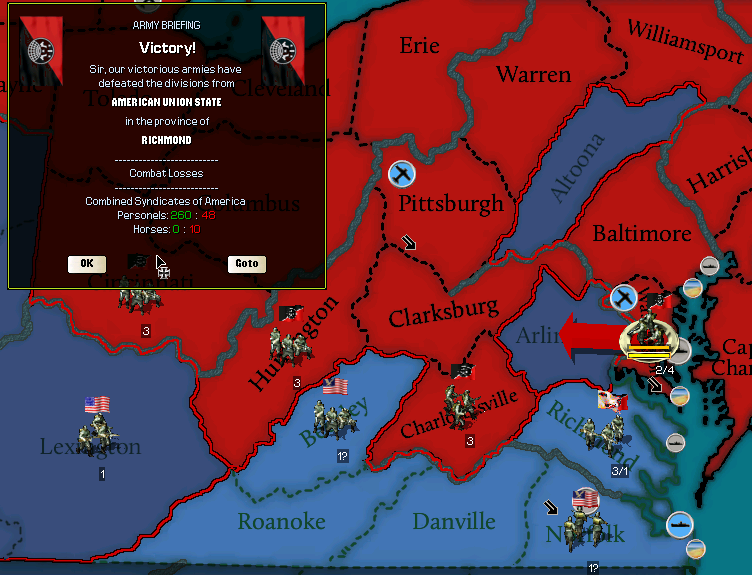 With the Union State moving its forces north in increasing number, Rose made an effort to dislodge and disrupt the Union State forces in Richmond from his strong position in the Blue Ridge Mountains, so that Marshall would have less trouble establishing himself in Arlington. 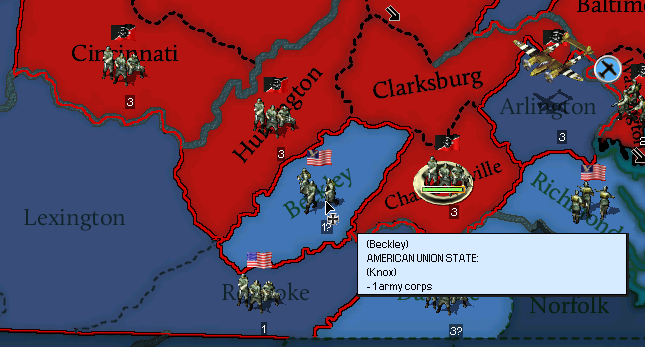 An opportunity presented itself in West Virginia, as a federal counterattack from Kentucky into the valleys of western Virginia cut off an overextended Union State unit in Beckley. 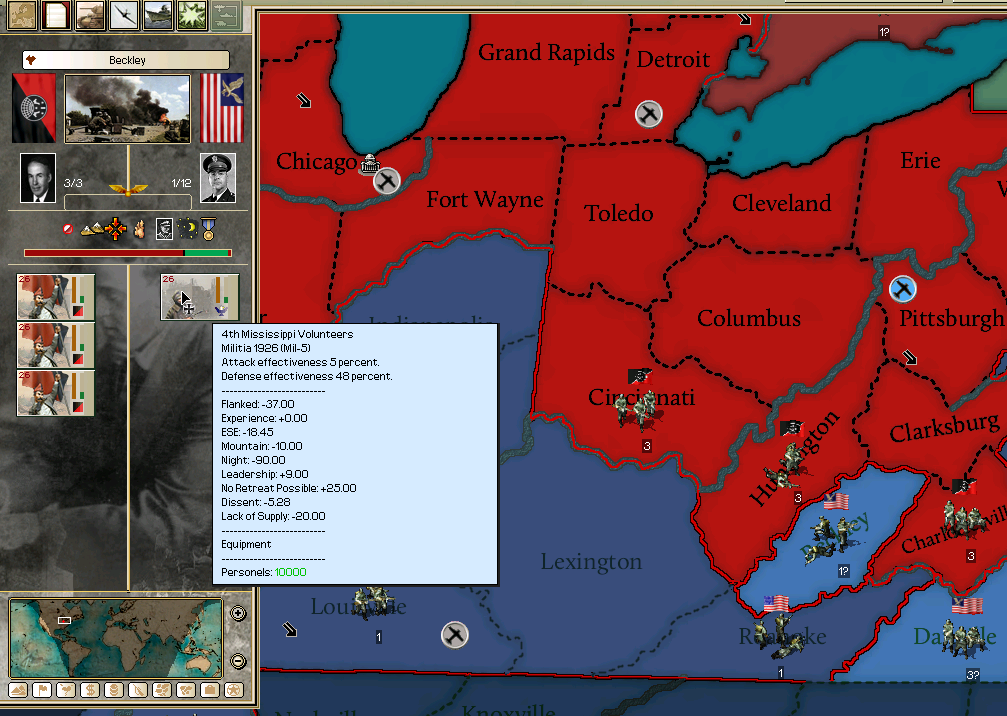 The unit was a militia from Mississippi, far from home in what must have been strange territory. They attempted to break out and evict the federals from Roanoke. Their chances of success were low to begin with but MacLeish seized the opportunity to wipe out a full enemy division. 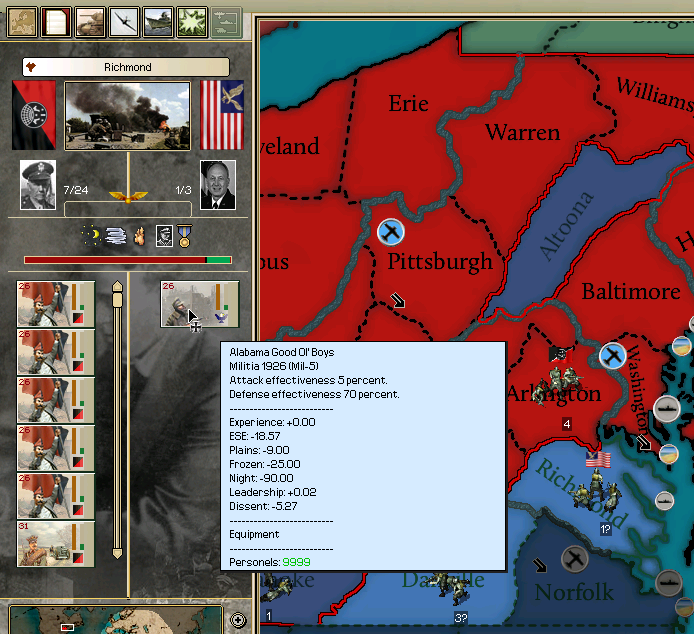 With Marshall across the Potomac and Rose well established in Charlottesville, the two units were in excellent position to assist each other. While Marshall's advance would affect the organization of his units, Rose could support the attack from Charlottesville while remaining stationary and recovering organization. 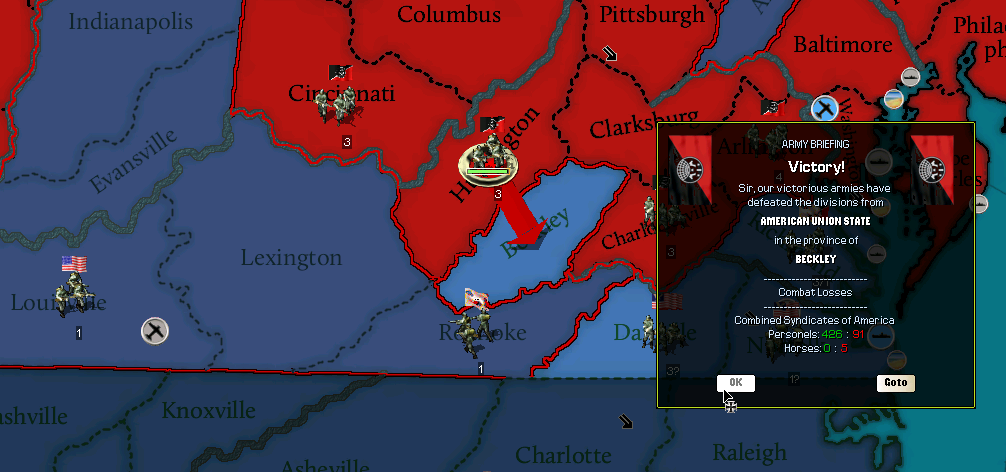 The federal advance did not last long before being repelled by Union State counter attack, though it lasted long enough for the cut off unit to be wiped out. 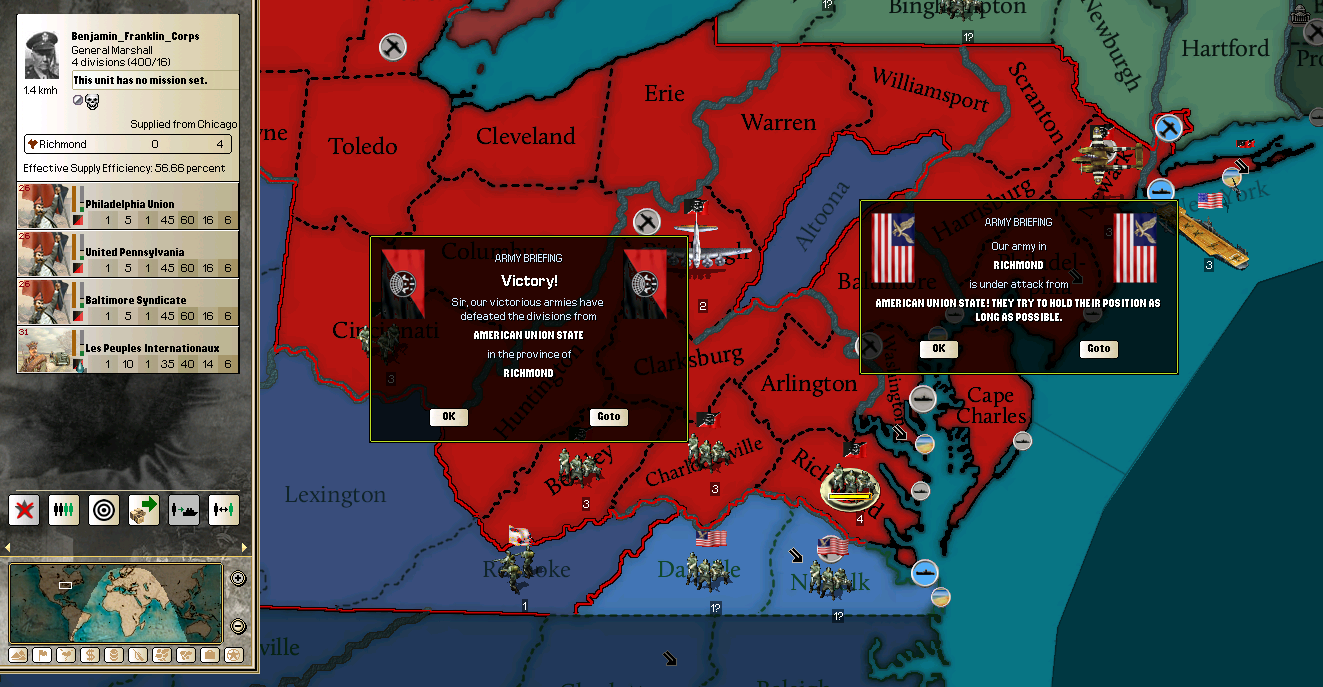 The Benjamin Franklin Corps completed its advance on Richmond without further incident. The support from the TAEF in Charlottesville allowed them to make it there in relatively good shape. If they had gone it alone and taken more damage, they could have been immediately evicted by Union State counterattack upon arrival. The Appalachian mountains and James River combined to provide a strong defensive line in Virginia that provided the Syndicate Guards with a chance to regroup and plan the next phase of the war.  While the plans were made and units prepared, the air war continued nonstop. Ground support operations were vitally important in weakening enemy concentrations to decrease the likelihood that they would start their own assault. 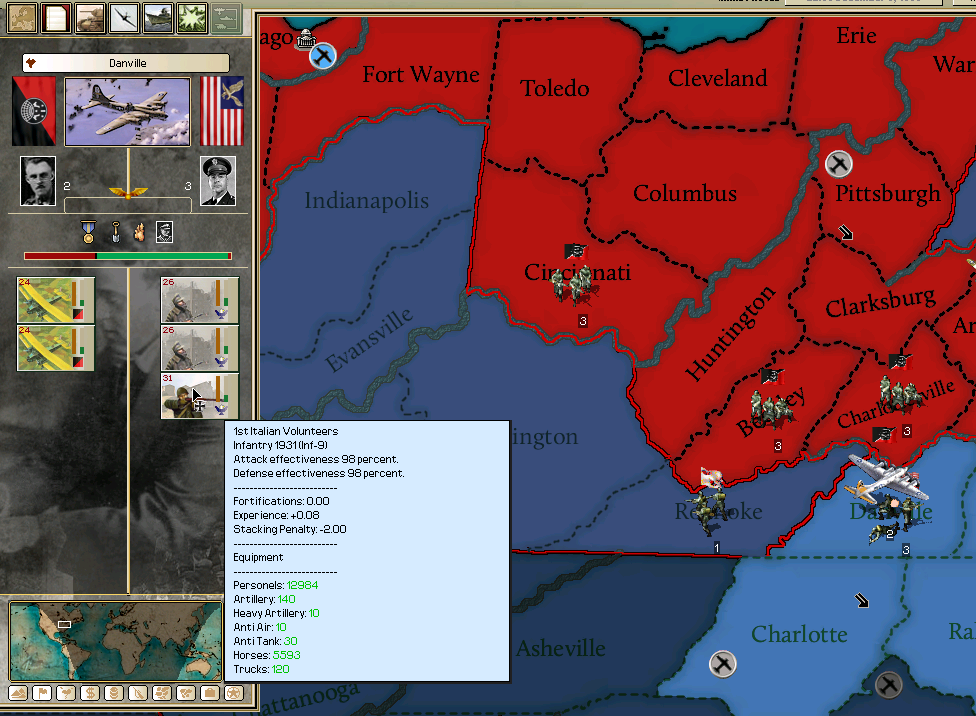 The flights also doubled as reconnaissance, providing valuable information on the composition of the enemy forces. The Danville concentration contained two militia units and one professional infantry division comprised of Italian refugees.  Somehow the pilots could tell from the skies that these were classy individuals. 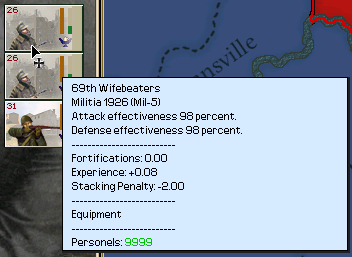 Very classy. 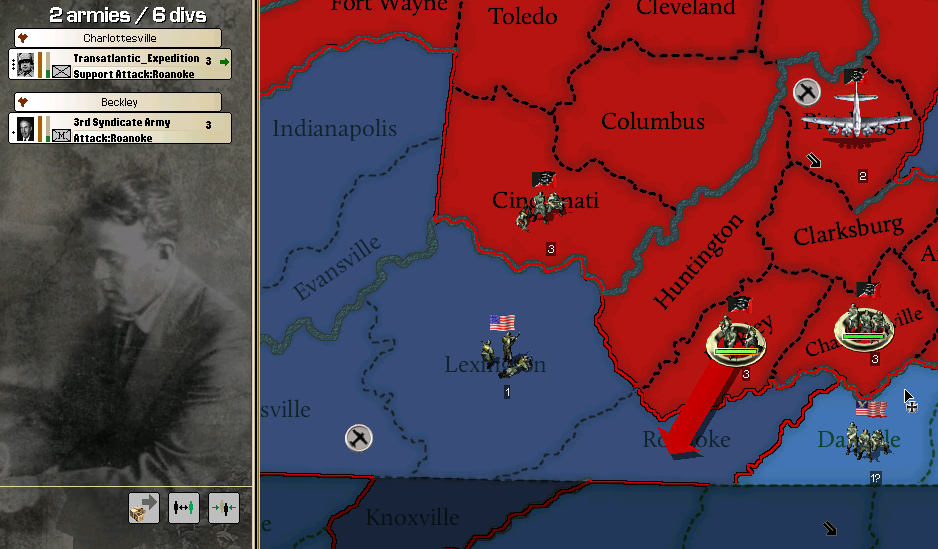 With the federals evicted from Roanoke, MacLeish's militia had an opportunity to move into the strategically important province of Roanoke. Whoever controlled Roanoke could support action across the entire region, including Knoxville and Charlotte. 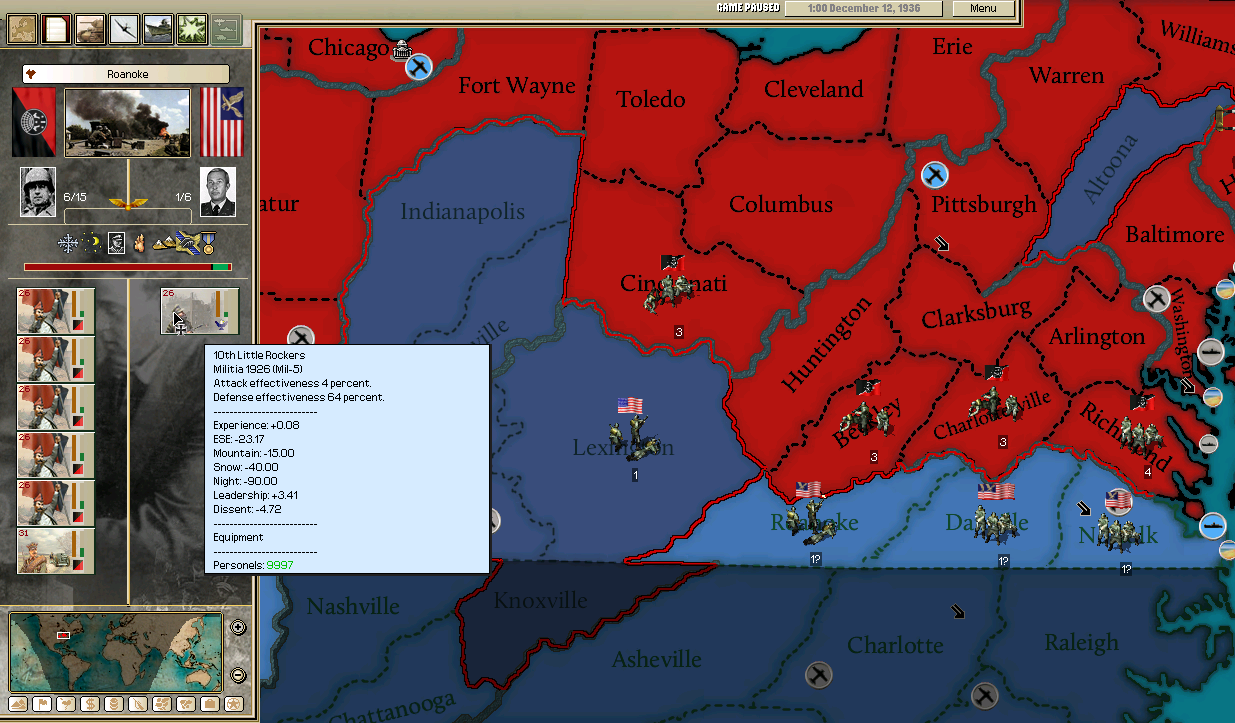 The Union State wouldn't let such an important city go down without a fight and moved some militia into the void before MacLeish could secure it. Rose immediately moved to support the push.  All available air resources were used to reduce the cost in lives and morale of taking the city. The flip side of Roanoke being able to attack so many places was that Roanoke could be attacked from many different places.  With Nelson securing Lexington, the Syndicate Guards were able to open another avenue of attack and pressure the defenders of Roanoke from north, west and east. 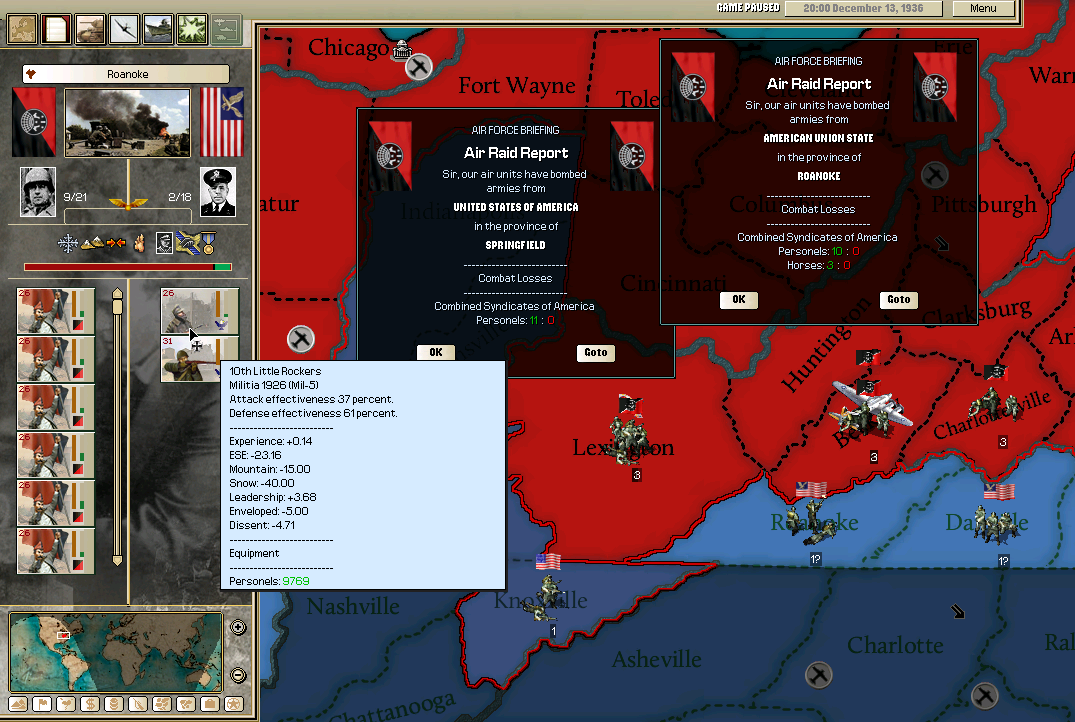 Even though a professional infantry division had arrived to back up the militia, the concentration of force was simply too great. 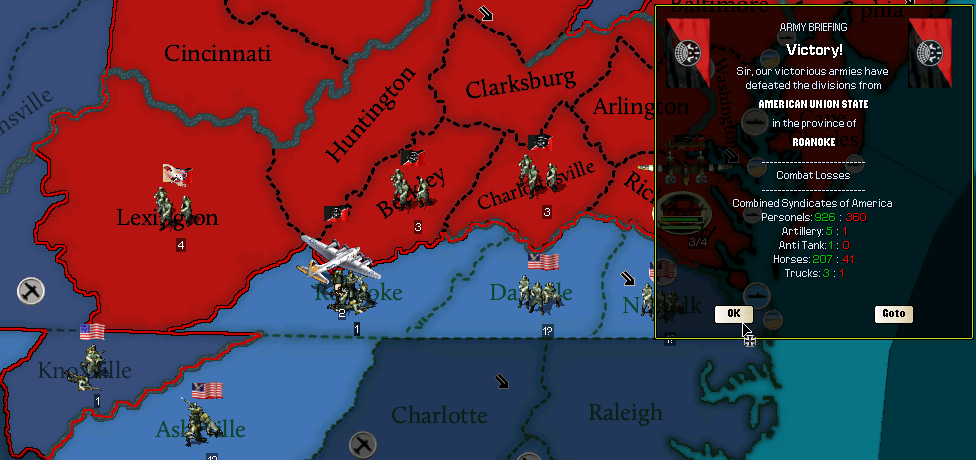 Ninety thousand men and air support did the trick, and the Union State was forced to retreat from the vital city.  MacLeish secured the city without much further trouble, putting the Union State forces in southern Virginia at serious risk and opening a path to the Carolinas. The River Valleys 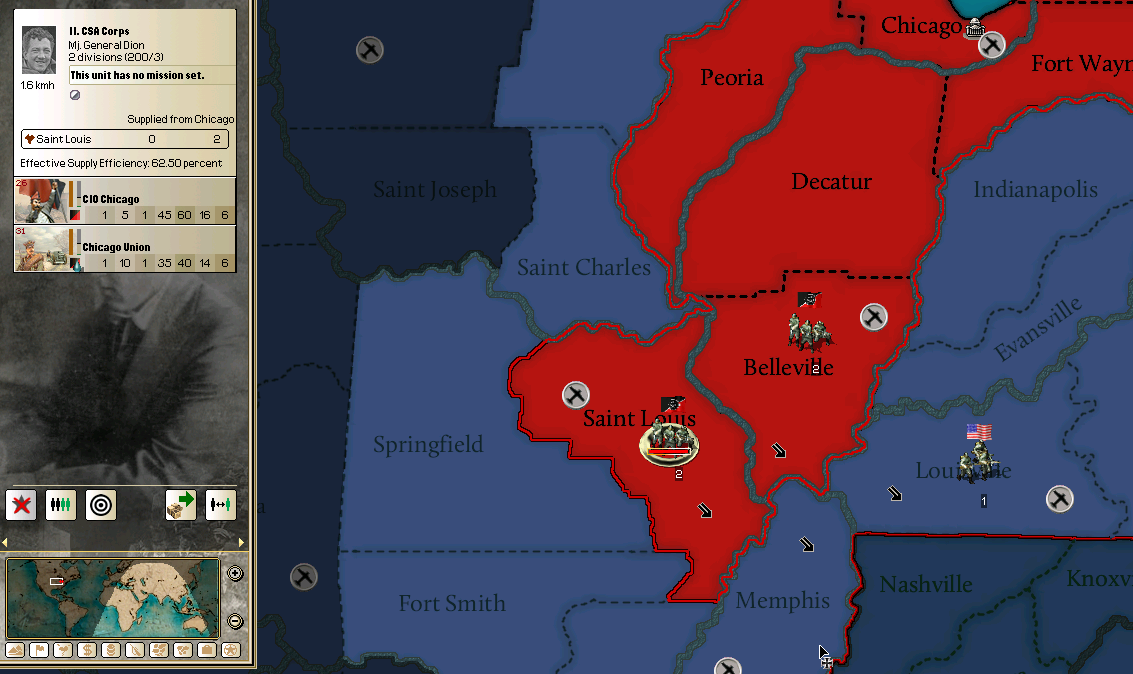 The Abraham Lincoln Corps split in two, with one half digging in behind the Ohio River in southern Illinois, and the other half crossing the Mississippi to secure the major city of Saint Louis. 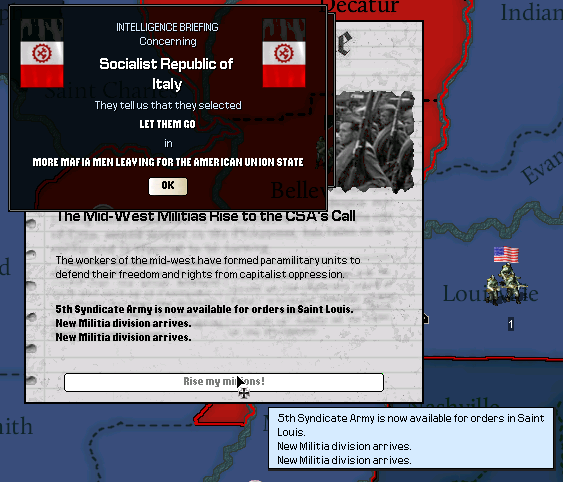 Saint Louis had been the site of a tense tug of war between the federally sympathetic mayor and the unions who sided with the Combined Syndicates. The capture of the city by the CSA triggered the mayor and the police loyal to him to flee west and the unions enthusiastically greeted the Abraham Lincoln Corps into the city. An estimated twenty thousand men volunteered to join the Abraham Lincoln Corps as part of the newly formed Saint Louis Syndicate Guard.  The Abraham Lincoln Corps was exhausted and needed time to regroup. The new recruits were, on the other hand, ready to go and decided to march on Memphis, which would cut off federal forces in Kentucky from their power base in the West and threaten the core of Union State territory.  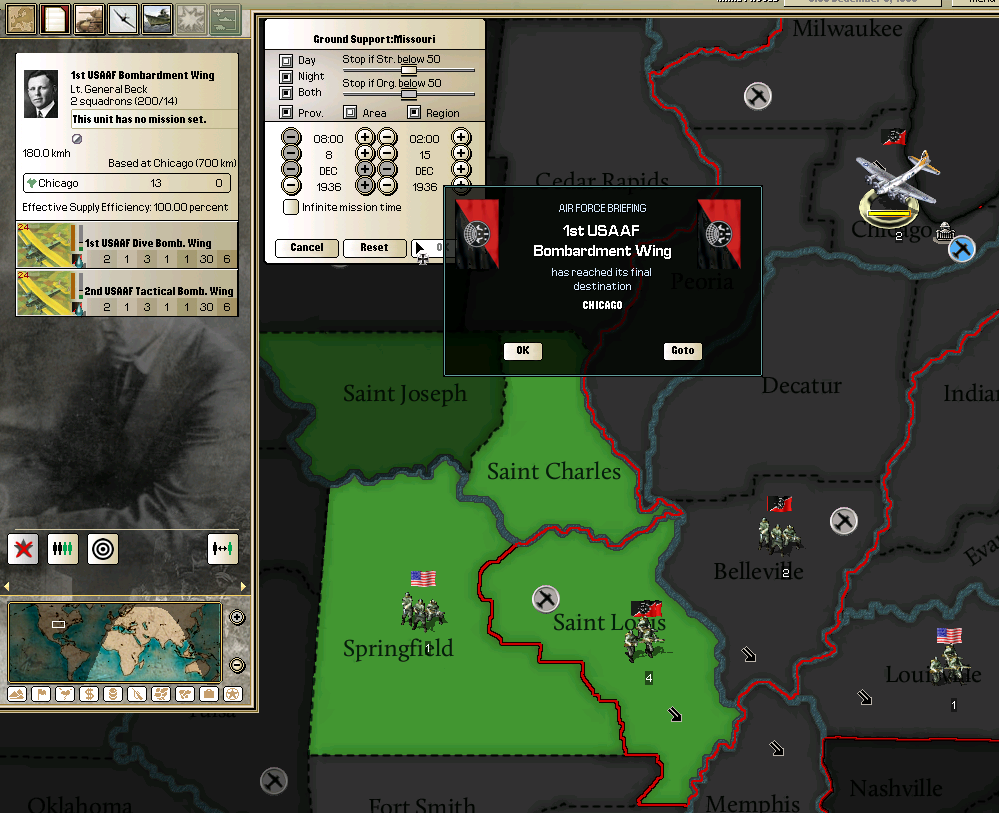 The capture of Saint Louis widened the front that the CSA needed to defend and so two wings of captured federal bombers from Washington were ordered to Chicago, where they would fly missions to Missouri to blunt the federal counterattack. 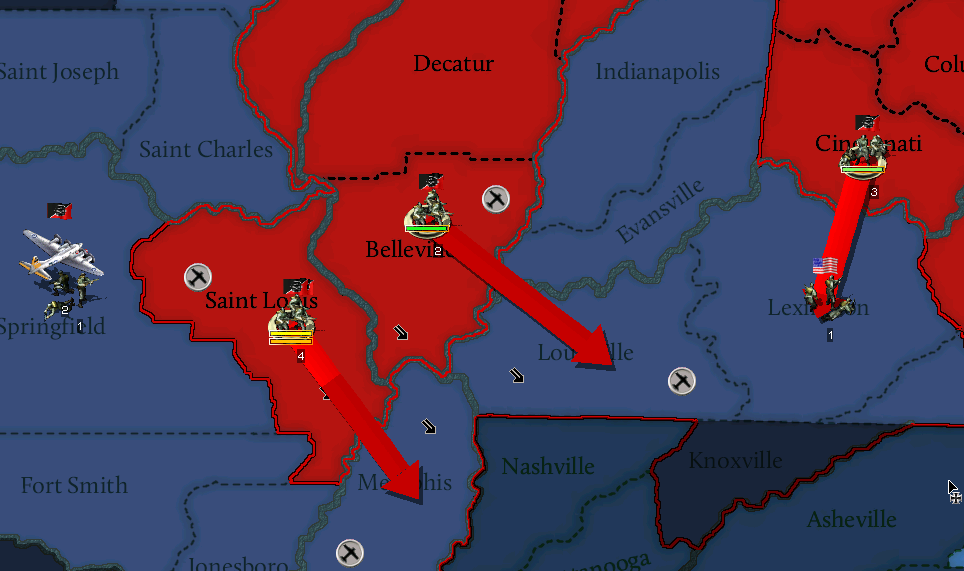 After the successful capture of Saint Louis, Haywood sought to continue the momentum and capture Kentucky before the Union State could. Haywood moved his forces across the Ohio to Louisville, while Nelson moved out of Cincinatti towards Lexington, engaging federal troops there. 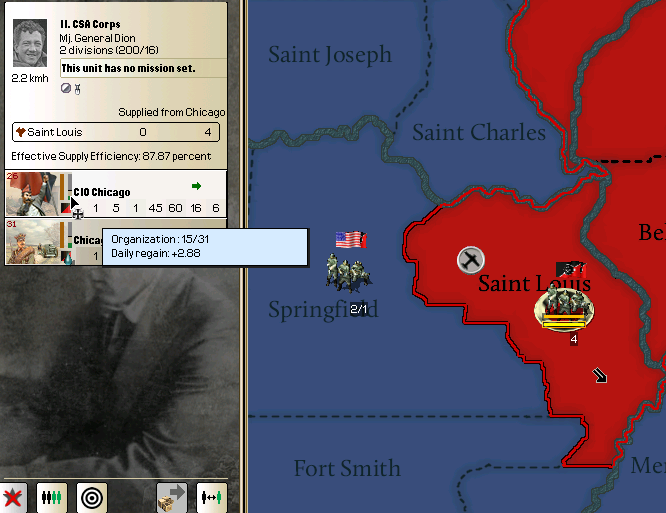 The professionalized Chicago forces in Saint Louis continued to recover and stay where they were. If Saint Louis fell to the federals, it would not be difficult for the aggressors to continue over the Mississippi and threaten the supply lines to the Kentucky advance, or even Chicago itself. 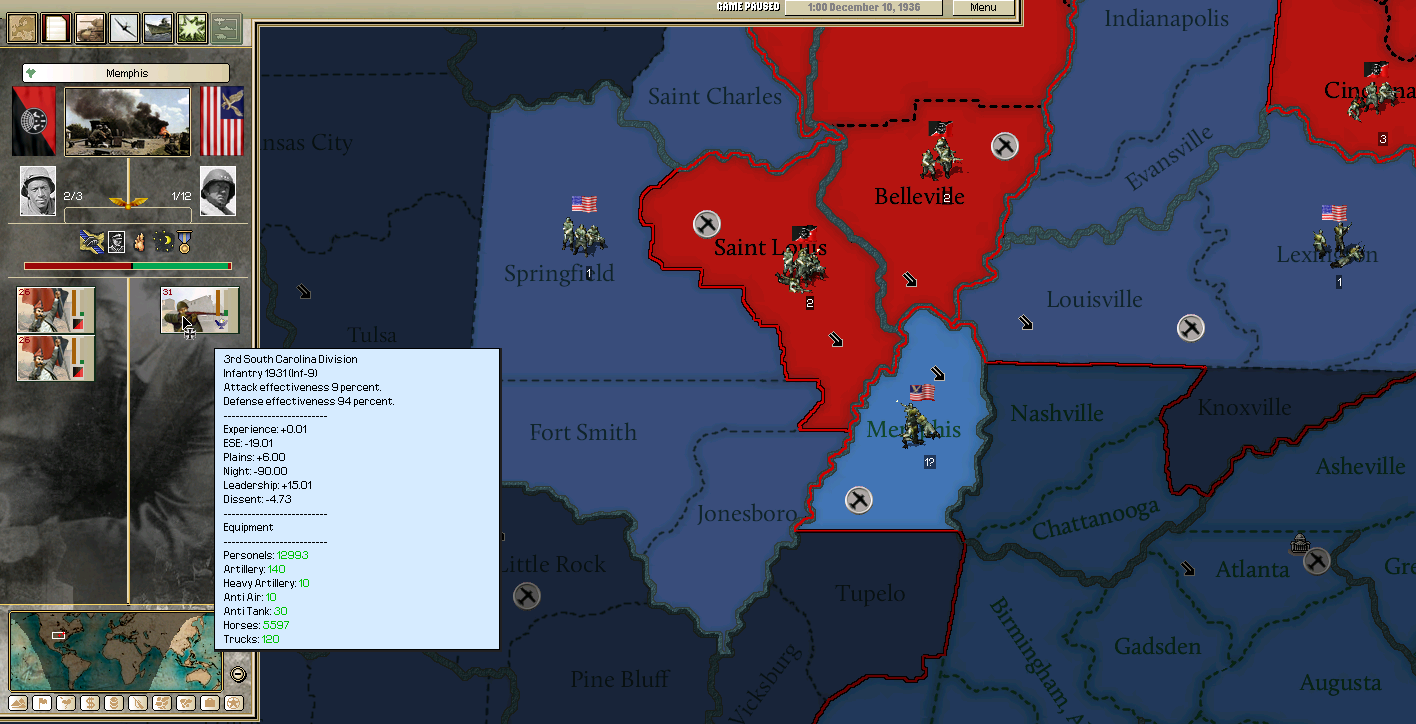 The offensive hit an obstacle in Memphis. A professionalized Union State infantry division occupied the city. The enthusiasm of the new Saint Louis recruits were no substitute for the experience they lacked. Even though the militias outnumbered the Union State defenders by two to one, the challenges of moving across the Mississippi were causing problems.  The attack on Memphis was a waste of effort. The militias were recalled home to recover and await the next action.   That action came when Dion made a brief foray out of the city to evict the Colorado National Guard which was establishing itself in the west of Missouri. 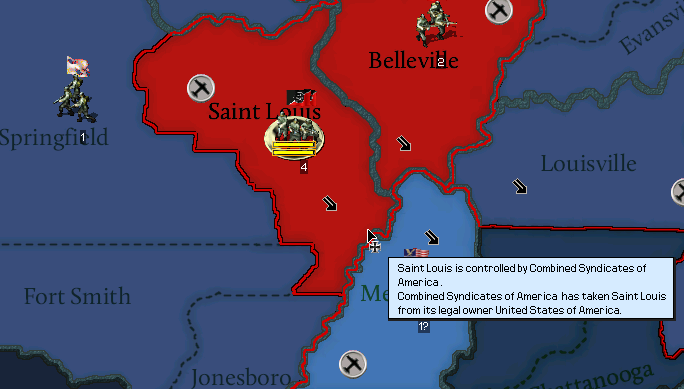 The intent was not to give chase or capture the rest of Missouri but rather to disrupt the National Guard enough that they would have to fall back to recover, giving the Western command time to achieve its goals in Kentucky.  The offensive was proceeding much better in Kentucky, with Nelson occupying Lexington with his forces in surprisingly good shape, good enough shape to support the all important attack on Roanoke to the east. 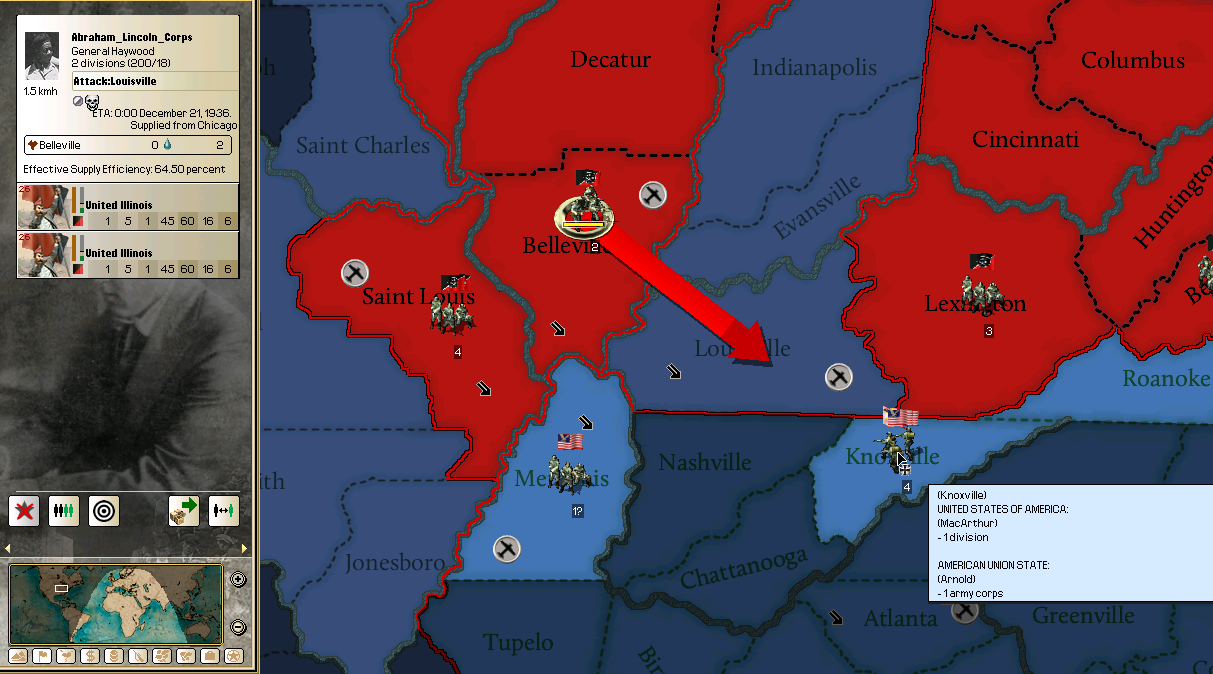 Haywood's forces were poised to enter Louisville with as little trouble as Lexington until the Union State recapture of Knoxville and pursuit of MacArthur's retreating division threatened to trigger a contest for the city. 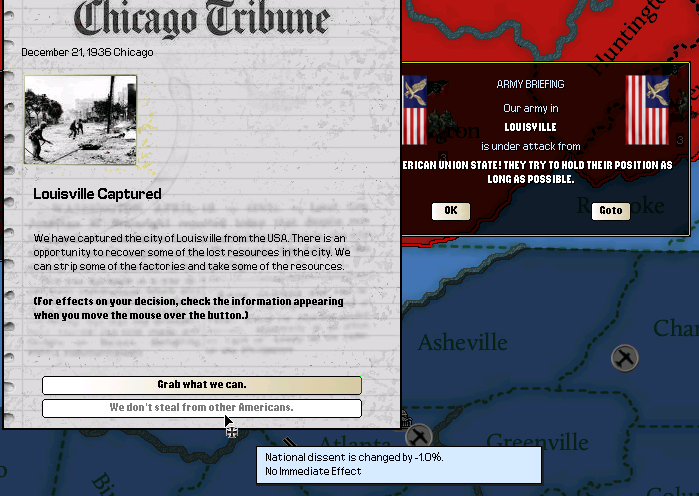 There was no time for any 'resource procurement' with the Union State bearing down on the militiamen.  The Union State forces included professional infantry led by a skilled leader. The only respite for the defenders was the snowstorm slowing down their attackers. The Union State had forces in Memphis and Nashville not committed to the battle of Louisville, so there was very real danger of Haywood being forced into a retreat to Belleville, putting Saint Louis at threat of being cut off. Chicago Tribune Headlines, December 25th, 1936  Occupied New England to Hold Elections, Syndicalist Candidates Banned  Southern Negroes Fleeing Union State Violence Welcomed In Chicago  MacArthur Warns Entente to Keep Away from Puerto Rico, Fortifies Commonwealth 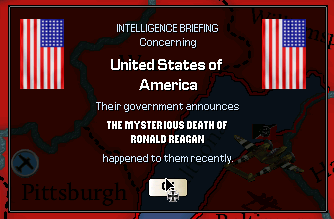 Few Mourn Death of B-List Actor in Battle 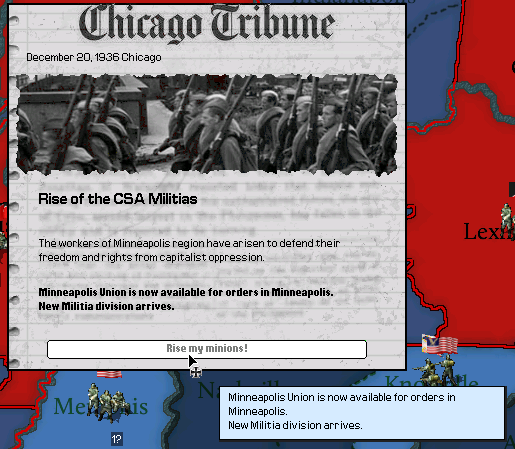 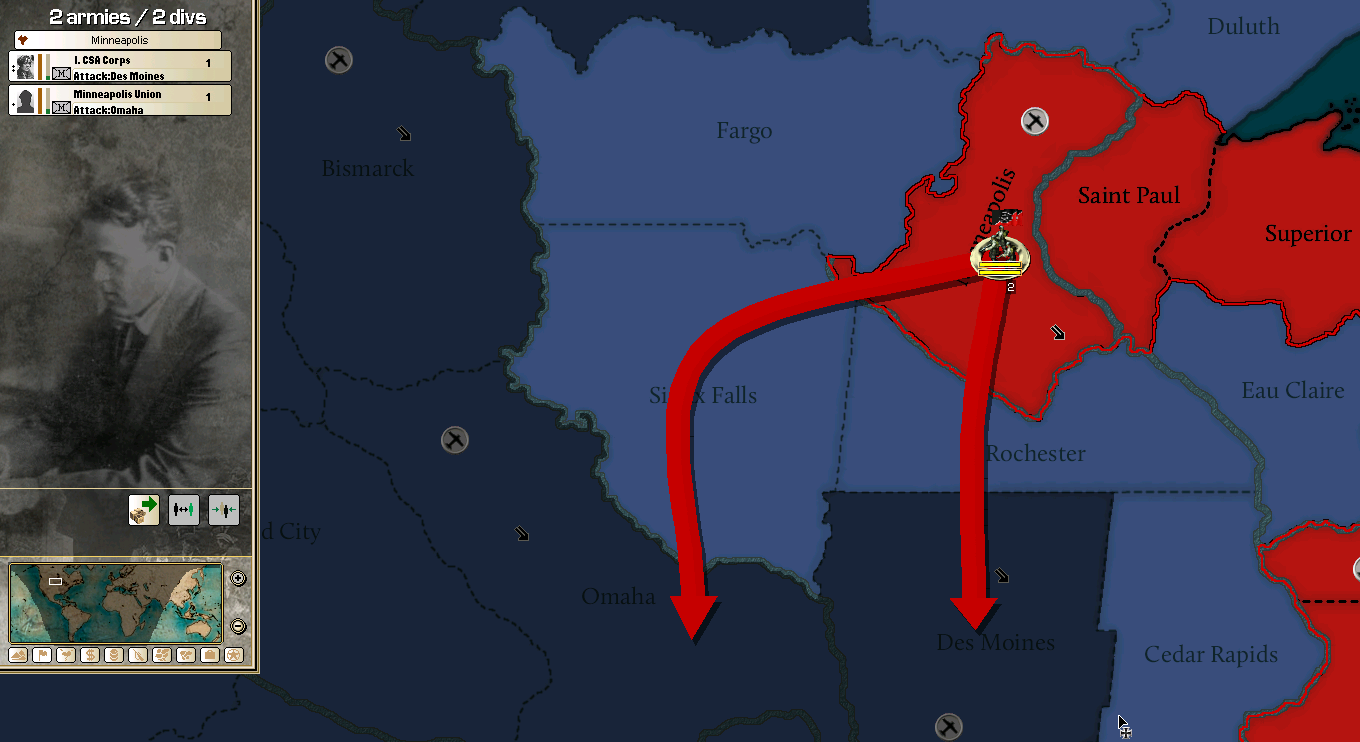 Minneapolis Liberated, Aalto Says It's "Only The First"
|
|
|
|
Drone posted:I think the gist is that trade unions under syndicalism are (supposed to be) run fairly democratically, and then those elected trade union leaders come together with each other to form a government. My understanding of syndicalism (which is not a hundred percent) plus my interpretation of what exists in the event texts about the CSA leads me to believe that there's a Central Committee, which is led by Jack Reed, and a Continental Chamber of Syndicates which is the top level of a hierarchy of union/syndicate representatives and chambers and whom we chose Paul Mattick as the leader of earlier. The Commune of France is organized on the premise of Bourses du Travail or labor exchanges, which are local bodies that deal with the workings of a city or area with the input and support of the unions and syndicates in that city. Paul Mattick is listed as being the option most similar to the Commune of France so I'll assume we're structuring ourselves in the same fashion. So I would imagine that the workers in the Widget Shop in Newark elect a delegate to the Widget Union of New Jersey and then that Widget Union participates in the labor exchange that makes the surrounding area run and then perhaps that body is part of a larger body for the New York metropolitan area, which then participates in the Continental Chamber. The principles of the movement would dictate that sovereignty and legal authority lies with the workers, which is represented by the Continental Chamber, which would have some kind of power over the Central Committee in theory. The Central Committee would act on behalf of the entire apparatus in realms of diplomacy and warfare, at this point probably with some added war powers granted by the Chamber, and the idea would be that as the situation gets better and threats are dealt with, the Continental Chamber would reclaim more power. Of course, there would be a danger of the Central Committee marginalizing the Chamber, and creating a Totalist situation. It's a cool thing to imagine but I haven't the faintest idea how such an apparatus would actually function on a level beyond a city, which I suppose some anarchists would say is the point.
|
|
|
|
These unions, where do they employ their labour? Worker-Cooperative ventures? Doesn't seem like the economy would be centrally dictated, so something like that?
|
|
|
|
At a high level it seems pretty analogous to a standard semi-presidential system, just that the channels through which representatives are elected are different. At the beginning of the campaign the events make it seem like Jack Reed gets to be in charge because he has unanimous support and was running for the presidency anyway, but afterwards it's not exactly clear how his successors get chosen. Because the period covered by this mod is almost completely filled with strife and war, and the modders haven't fleshed out the CSA very much after the civil war, I get the impression that structure of the CSA is very informal and functions only because they're united by Jack Reed. Maybe after you beat the game they all get together and write out a constitution or something.
|
|
|
|
Yeah, it sounds to me that instead of voting for representatives from Colorado, Florida etc, you're getting people like the Senator of the Automobile Industry clashing heads with the Senator of the Banks, with various brands being the governmental level below (can't remember at the moment).
|
|
|
|
How long had the war been going at this point? I'm just wondering why AUS has higher encryption tech than USA.
|
|
|
|
Pimpmust posted:These unions, where do they employ their labour? Worker-Cooperative ventures? Doesn't seem like the economy would be centrally dictated, so something like that? Yes, part of the ideal of syndicalism would be to get rid of the hierarchical structure in the workplace and instead have widespread workplace democracy in place.
|
|
|
|
CommissarMega posted:Yeah, it sounds to me that instead of voting for representatives from Colorado, Florida etc, you're getting people like the Senator of the Automobile Industry clashing heads with the Senator of the Banks, with various brands being the governmental level below (can't remember at the moment). Actually, that's more of how the specific Corporatism of the American Union State is stated to work: quote:The Congress of American Union State has two chambers: the House of Representatives and the House of Corporations. Members of the House of Representatives are chosen on direct elections whereas those of the House of Corporations are chosen by interest groups, who also choose the Speaker of the House of Corporations
|
|
|
|
RZApublican posted:Actually, that's more of how the specific Corporatism of the American Union State is stated to work: SO basically how our government works now, but with representation for the people 
|
|
|
|
theblastizard posted:SO basically how our government works now, but with representation for the people Stop being depressing.
|
|
|
|
theblastizard posted:SO basically how our government works now, but with representation for the people Power to the
|
|
|
|
In Corporatism, man oppresses man, but under Syndicalism it is the other way around.
|
|
|
|
GrossMurpel posted:How long had the war been going at this point? I'm just wondering why AUS has higher encryption tech than USA. Maybe six weeks? Not very long.
|
|
|
|
GrossMurpel posted:How long had the war been going at this point? I'm just wondering why AUS has higher encryption tech than USA. They're just speaking Creole.
|
|
|
|
A complex cipher consisting of yee-haws, grunting, and banjo chords.
|
|
|
|
Chapter Four: Feels Like Going Downhill (Late December 1936-January 1937) The only way to save Louisville was to find ways to take the pressure off. Sending reinforcements was not an option, as Haywood's forces would not be able to stand their ground long enough for them to make any difference. The only option was then to counterattack from another direction and to provide immediate air support.  Nelson and MacLeish's militias in Lexington and Roanoke provided the release for Haywood's men. Nelson's force was in a prime position to turn a defensive situation into an offensive situation and occupy the defensible city of Knoxville. 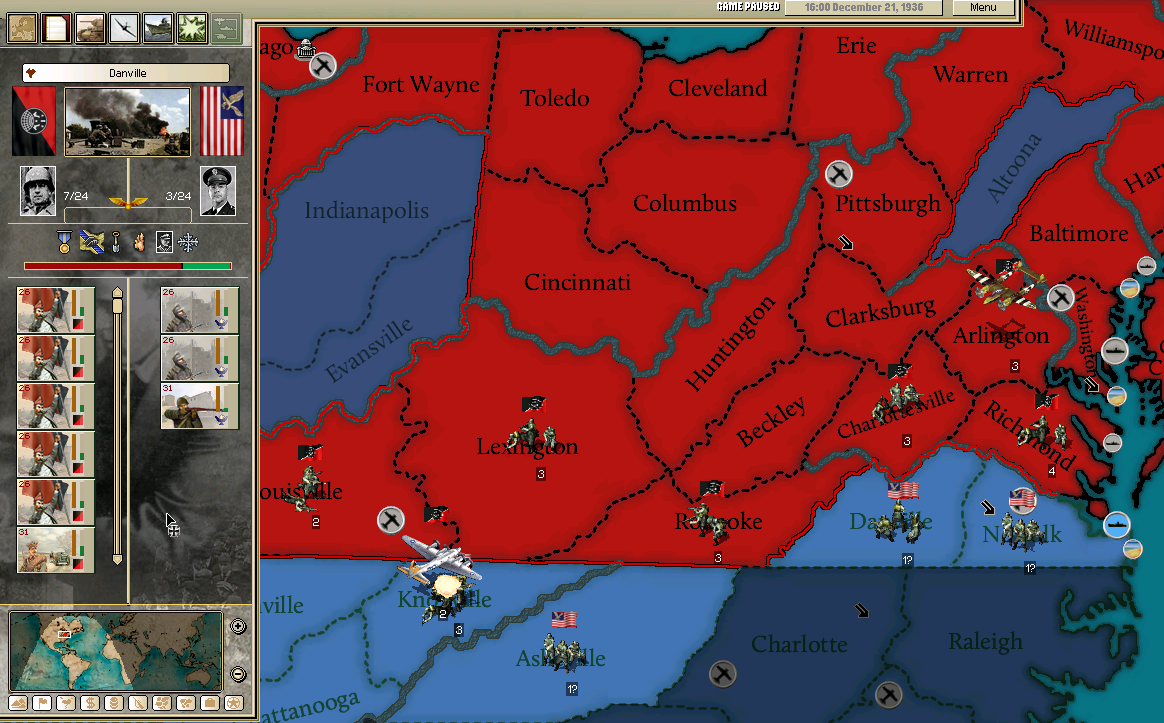 The Union State could not be allowed to rest. If they felt there was no threat in the east, they could have redeployed forces to Tennessee to break Haywood. With that in mind, Rose and Marshall begin their attack across the James River. 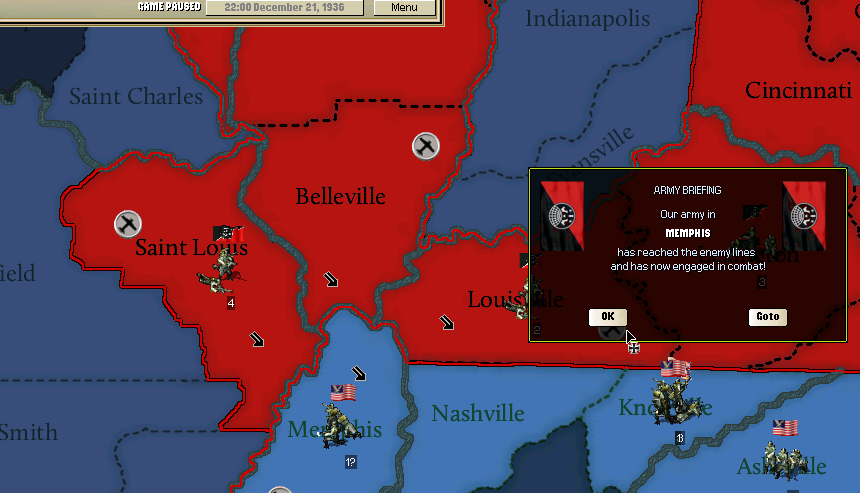 Similarly, George Patton's unit in Memphis very well could have been the difference in the battle of Louisville. The Abraham Lincoln Corps in Memphis was tasked with evicting them to protect the western flank of Louisville. 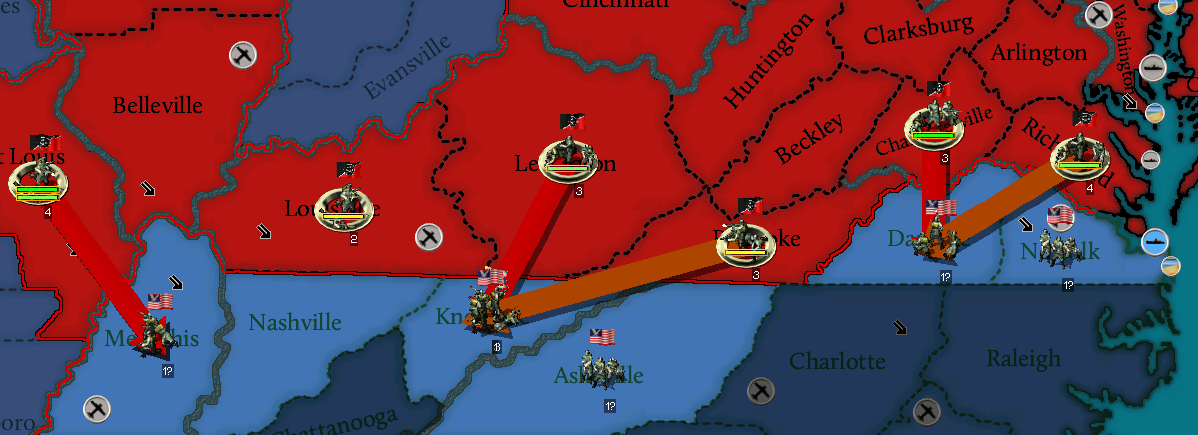 It was an ad hoc solution to the problems in Kentucky, but it represented a great three pointed offensive that brought the war into the core territories of the Union State for the first time. 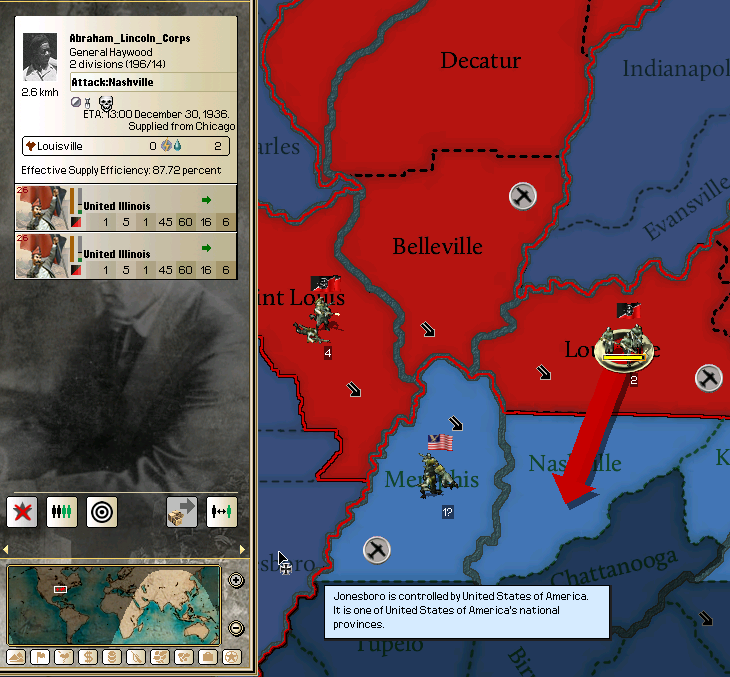 The pressure finally achieved its initial goal and the attack on Haywood was called off, freeing up his forces to move into the undefended city of Nashville. 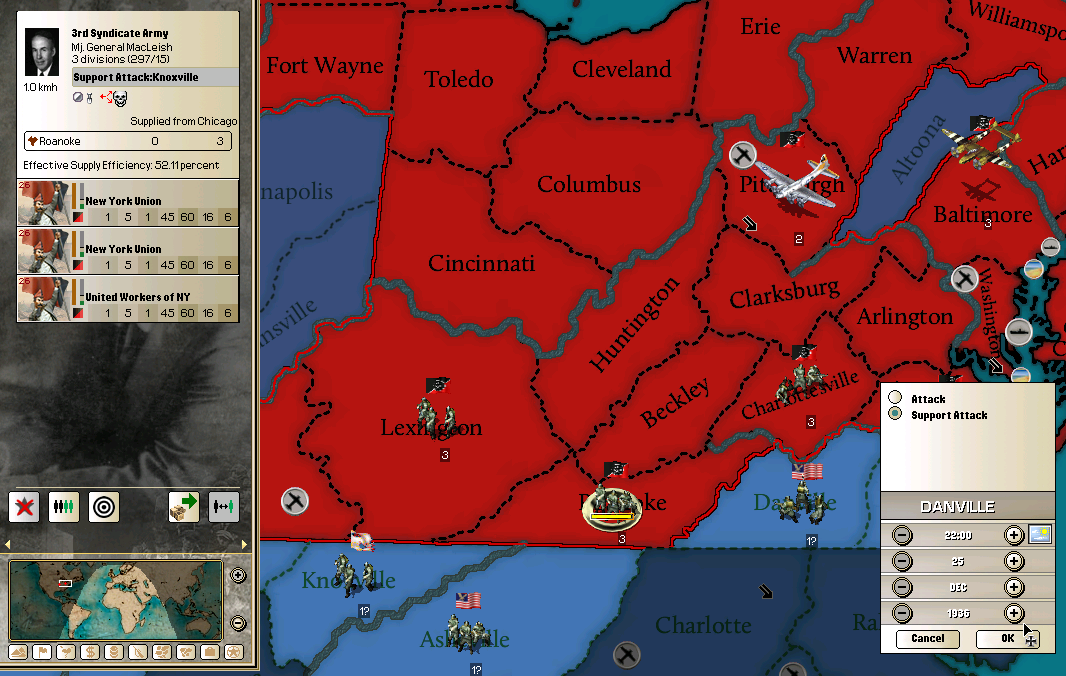 The attacking Union State forces in Knoxville were forced to retreat and so the supporting units of MacLeish in Roanoke were free to support Rose's offensive into southern Virginia. 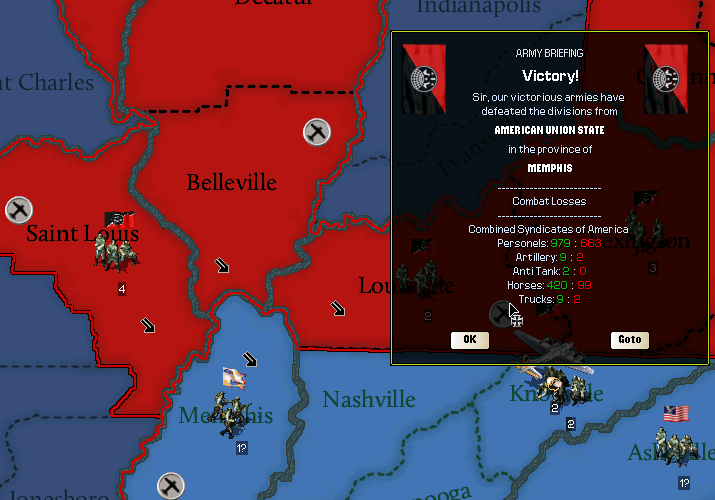 Similar success was found in Memphis.  With the Union State on the run in the west, the Abraham Lincoln Corps felt secure enough to begin an advance to the west into federal territory. The federal troops were largely engaged against the Pacific States and Mexico, neither of which were engaged in the total war that the federal government, CSA and Union State were embroiled in. Eventually peace of one kind or another would be brokered, and those federal troops would show up along the Mississippi.  With Norfolk out of federal hands, Rickover's fleet felt confident enough to go out to sea for the first time in the hunt for federal and Union State ships.  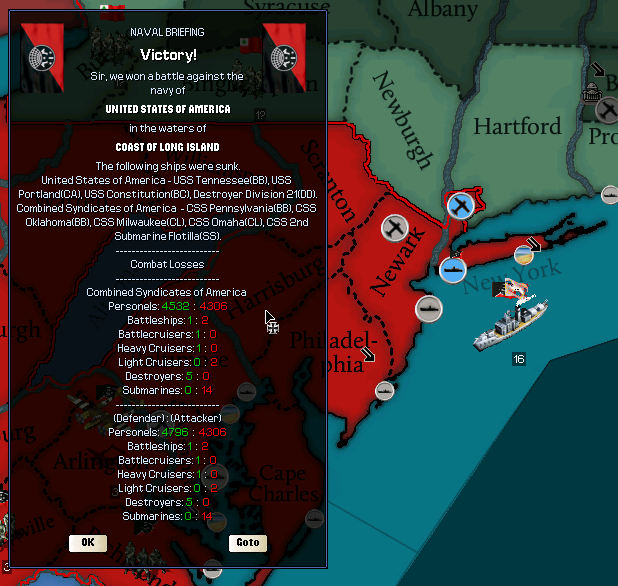 They found them immediately and scored a costly victory, losing two battleships while forcing out the federal fleet from the waters off the Jersey Shore. 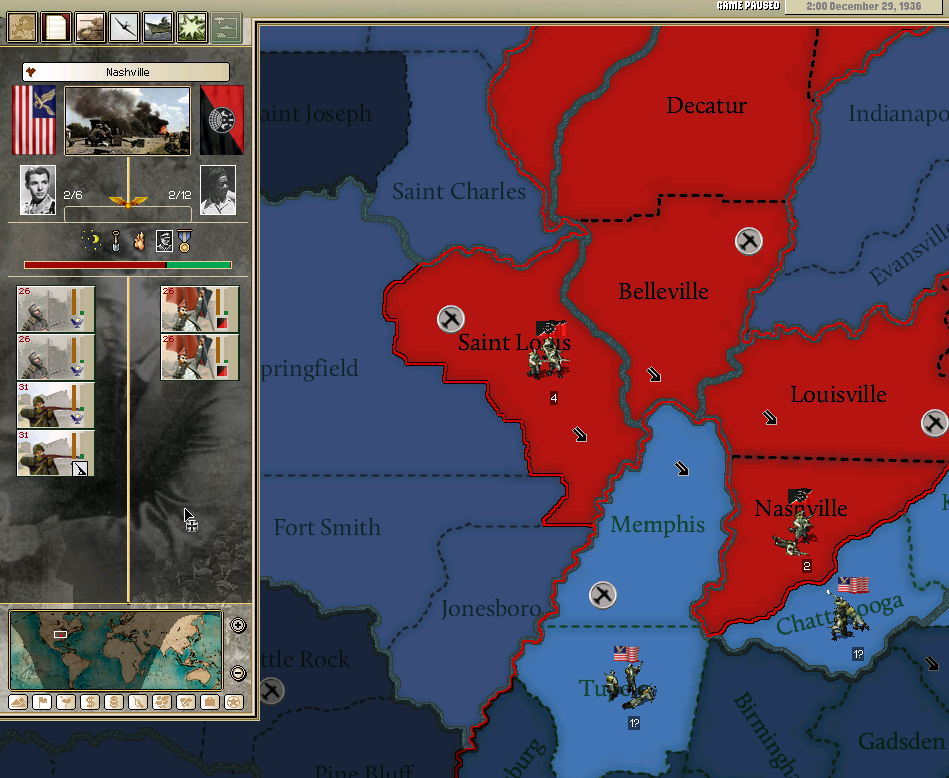 Haywood's advance into Nashville was beset by problems immediately, attacked by a quantitatively and qualitatively superior force upon arrival. 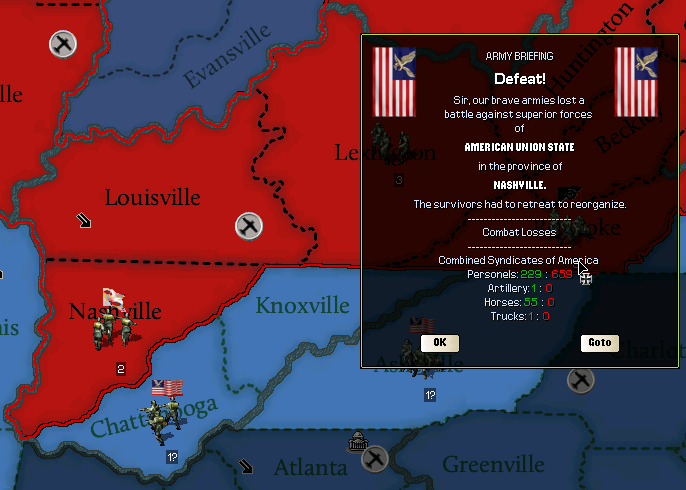 A retreat was the only option. When Memphis and Knoxville were under control, it would be possible for Haywood to retake the city with support from the flanks. 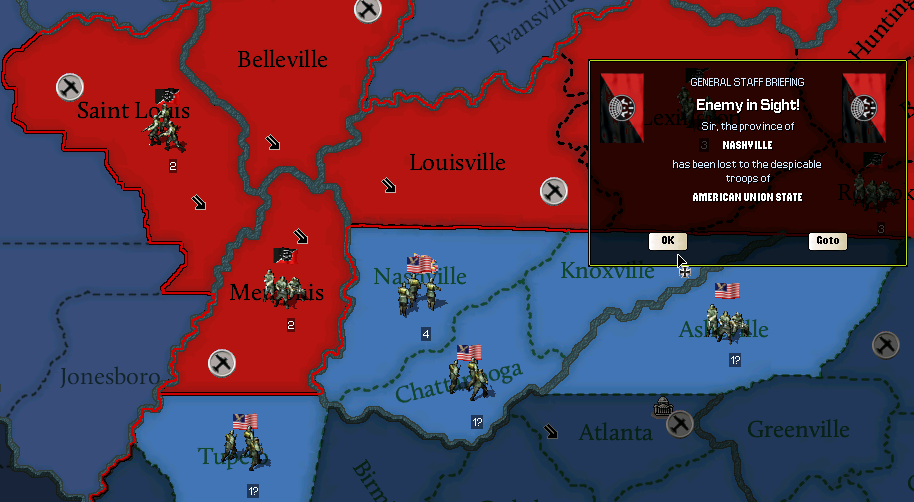 As expected, the Union State marched into Nashville and began marching north, hoping to turn their victory into a rout.  Their advance was threatened by CSA control of Memphis. There was little time to go after the fleeing reactionaries with a possibly crucial battle on the horizon. 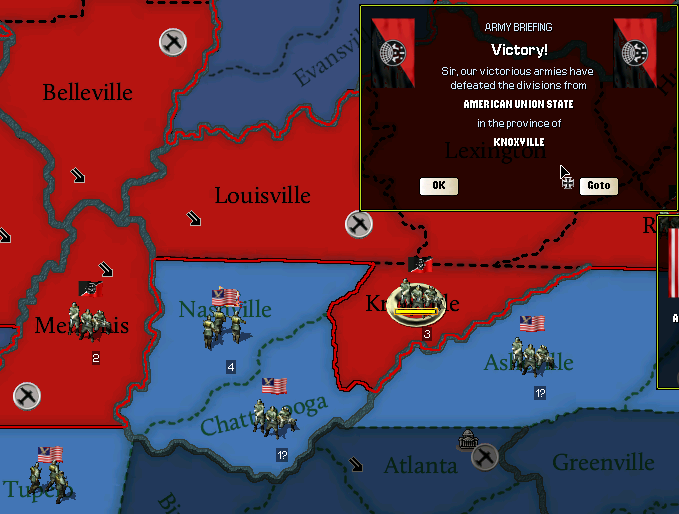 The Union State push was put under even more severe threat by the CSA capture of Knoxville. With the ends of Tennessee under control of the CSA, any advance up the middle by the Union State was potentially suicidal.  There were many strategies bandied about such as allowing the enemy to occupy Louisville then encircling them there, but the command in the West found it more important to keep the southern momentum going and therefore, having Haywood's men being evicted from yet another city was considered an unacceptable delay.  The TAEF occupied Danville without facing counterattack while the Benjamin Franklin Corps began an assault on Norfolk, hoping to deny the Union State a crucial naval base. What they discovered was that the Union State's local resistance was concentrated on the coasts while the center of North Carolina was undefended. Marshall and Rose had an opportunity to move south and flank Atlanta. 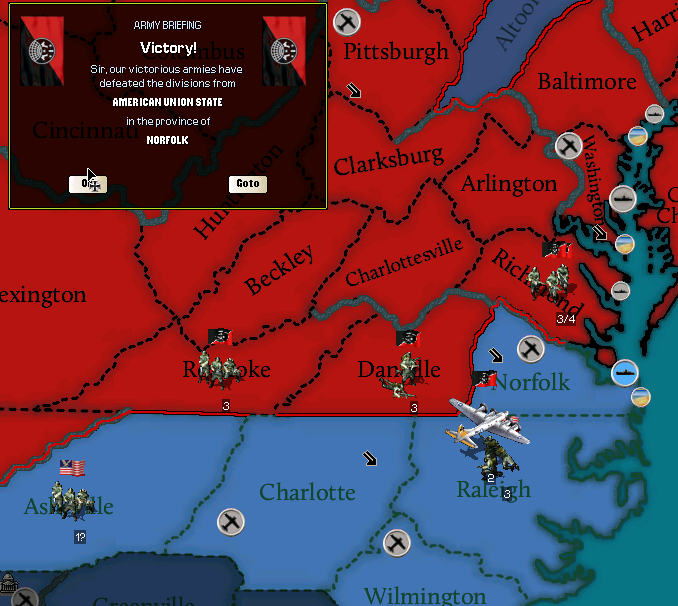 The defenders of Norfolk surrendered almost immediately. 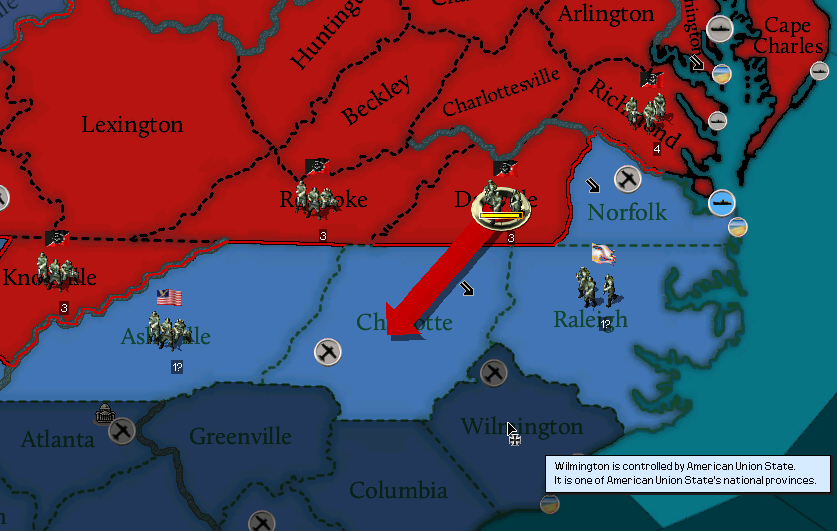 After the TAEF evicted the defenders of Raleigh, they turned west towards Charlotte. The whole operation had left the Carolinas wide open to the CSA. 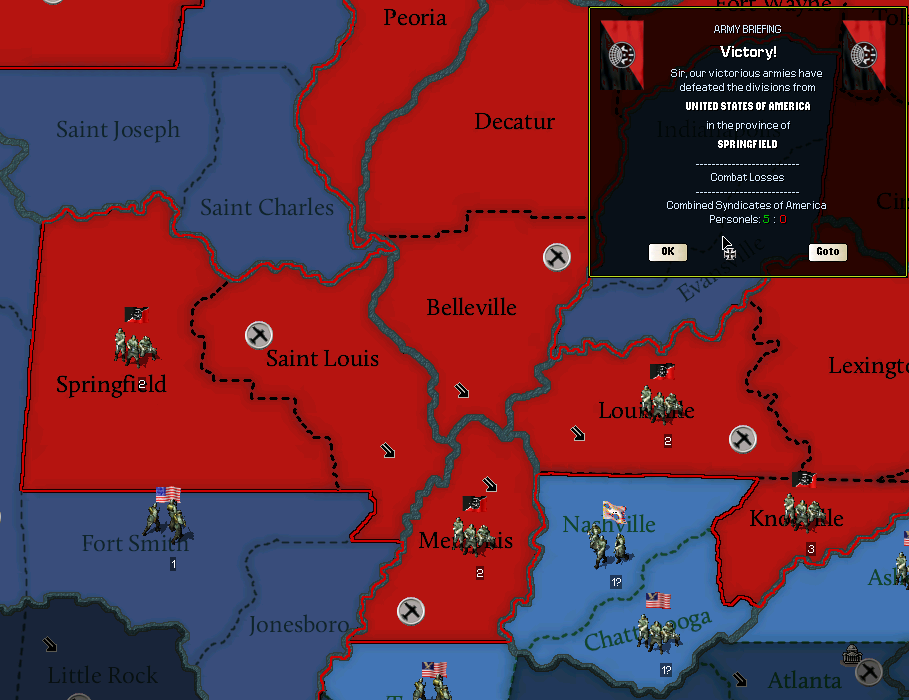 The attack into the west captured Springfield, which opened up Saint Louis to capture from federal forces in Arkansas. 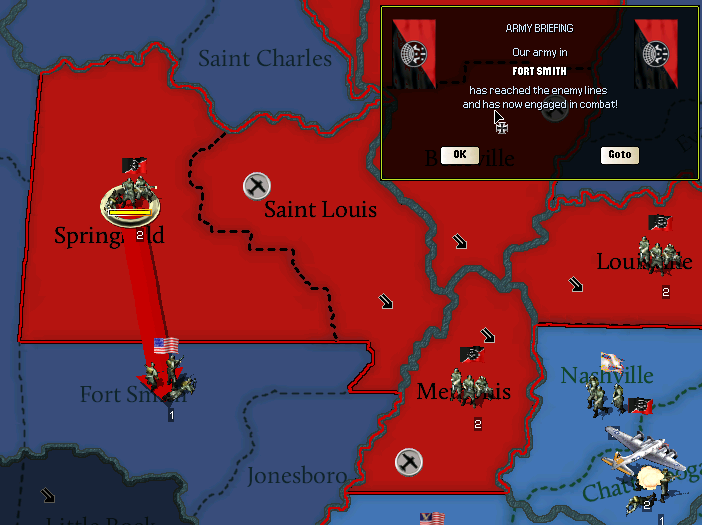  This was clearly unacceptable and great effort was expended to eject those forces and protect Saint Louis.  The naval campaign turned into a minor disaster for Rickover. While the initial battle had been a victory, the CSA did not have the amount of ships at its disposal that the federal government did and so they suffered a defeat and were forced into hiding in Elizabeth. 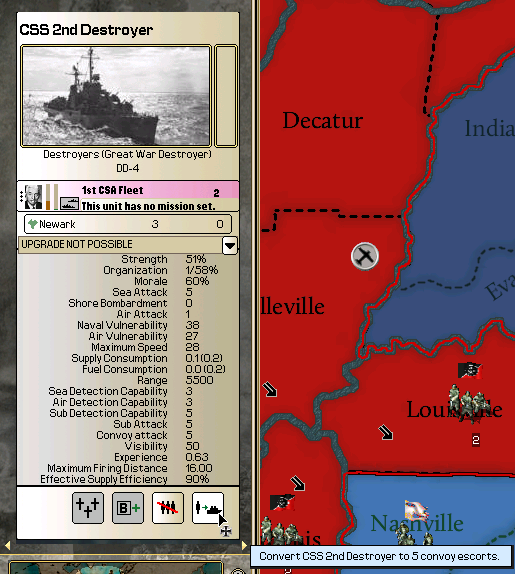 Despite the losses, the local shipbuilding syndicate anticipated victory and decided it was time to prepare for overseas operations. If troops were to land on Puerto Rico or go to Europe in a future war there, they would need supply convoys and those supply convoys needed escort ships. The aging destroyers of Rickover's battered fleet were converted for escort duty.  The naval setbacks did not affect the CSA's progress on land. Charlotte fell to the TAEF without a fight, leaving the unit well rested and prepared to support Marshall's potentially contested bid for Raleigh if necessary. 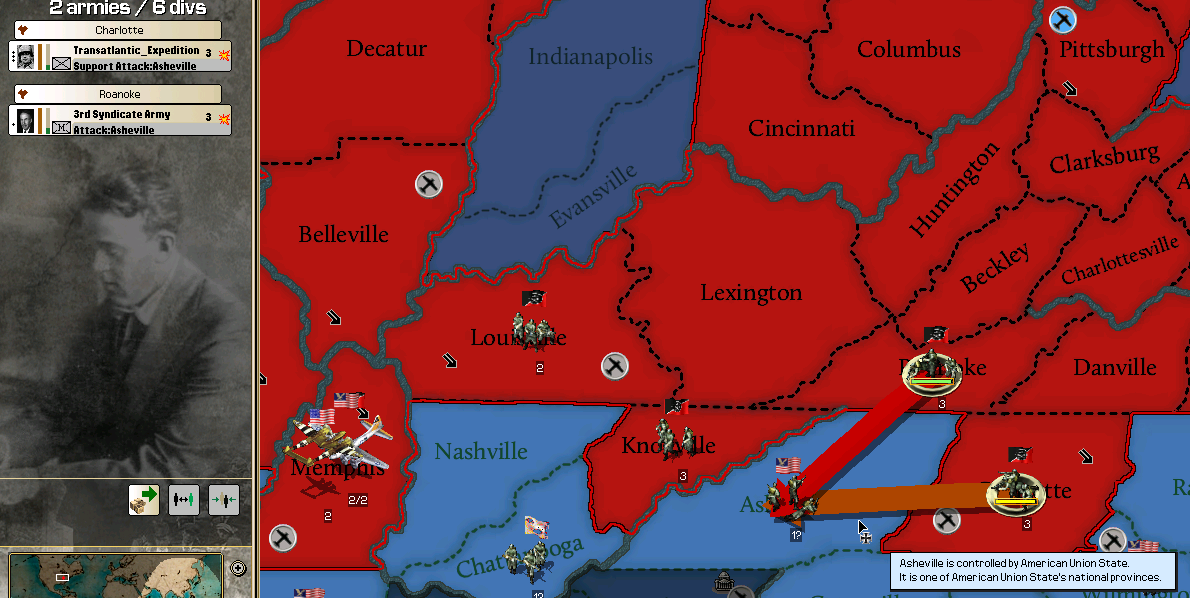 While that was going, the attack moved forward in the center, with Nelson's militias in Knoxville attacking Chattanooga and MacLeish's forces beginning their advance south towards the Piedmont town of Asheville.  The penetration and support tactics of the Syndicate Guards meant that each unit was able to fight in multiple battles in quick succession. The Transatlantic Expeditionary Force was a sterling example of this type of quick movement and force multiplication, contributing to the success of both Marshall and MacLeish's forces. 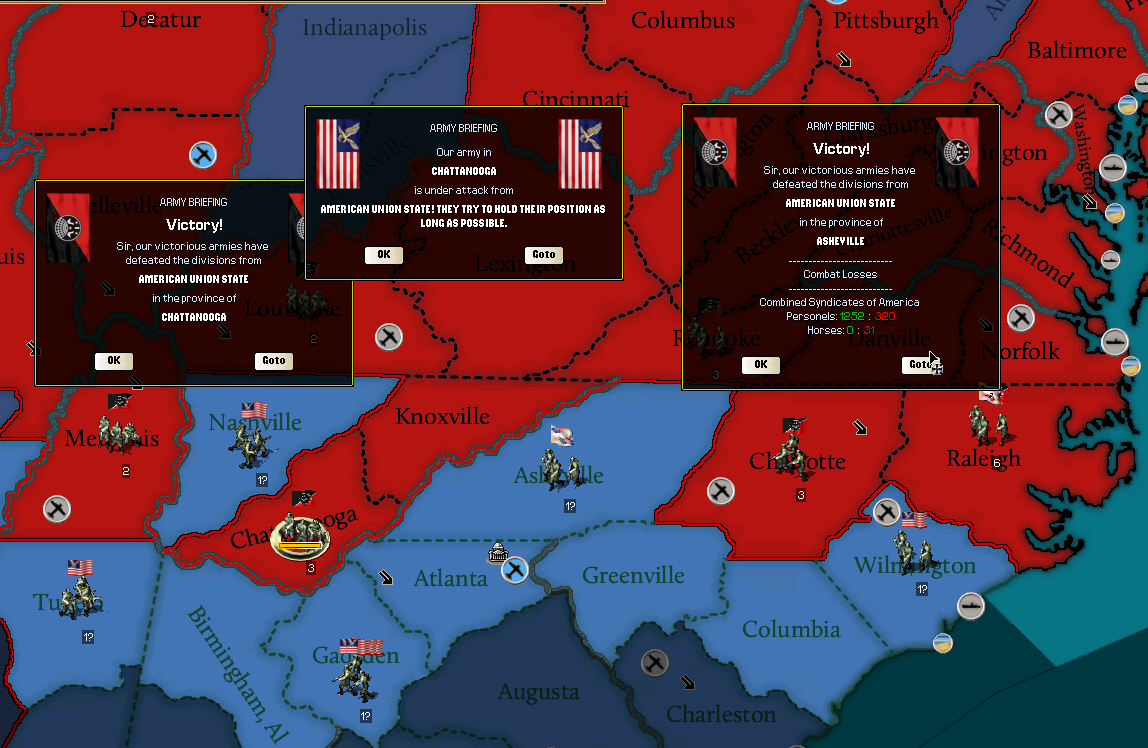 The attacks were both successful, and panic set in across the Union State as the 'godless syndie bastards' came closer and closer to Atlanta. csm141 fucked around with this message at 17:20 on Nov 18, 2014 |
|
|
Chief Savage Man posted:
Ah, the "convert to convoys/escorts" button, AKA the "gently caress this reasonable navy poo poo I'm building sub deathfleets again" button in my case.
|
|
|
|
|
When you take Atlanta make the ghost of William Tecumseh Sherman proud.
|
|
|
|
With all this fighting the Union, I wonder where the Feds' army is. Hopefully not in the midwest, advancing on the Great Lakes.TheMcD posted:Ah, the "convert to convoys/escorts" button, AKA the "gently caress this reasonable navy poo poo I'm building sub deathfleets again" button in my case.
|
|
|
|
TheMcD posted:Ah, the "convert to convoys/escorts" button, AKA the "gently caress this reasonable navy poo poo I'm building sub deathfleets again" button in my case. "Battleships? gently caress this, I'll build 15 CVs in 1941."
|
|
|
|
frankenfreak posted:With all this fighting the Union, I wonder where the Feds' army is. Hopefully not in the midwest, advancing on the Great Lakes. Yeah, this strategy of focusing entirely on the Union State would never work for me. The federals are always pushing towards the great Lakes from the west within a couple weeks of the war's start when I play the CSA.
|
|
|
|
ArchRanger posted:Yeah, this strategy of focusing entirely on the Union State would never work for me. The federals are always pushing towards the great Lakes from the west within a couple weeks of the war's start when I play the CSA. Most of the time, don't California and Mexico chicken out of war with the Federals, though? That's been the case most times I've done Kaiserreich, which has freed the Federals to unleash hell on the CSA and AUS.
|
|
|
|
Reveilled posted:Most of the time, don't California and Mexico chicken out of war with the Federals, though? That's been the case most times I've done Kaiserreich, which has freed the Federals to unleash hell on the CSA and AUS. Yeah, the PSA almost never fights. Mexico seems more inclined to it but definitely isn't common either. Mexico is bad enough but the PSA also joining in is a death sentence for the USA.
|
|
|
|
ArchRanger posted:Yeah, this strategy of focusing entirely on the Union State would never work for me. The federals are always pushing towards the great Lakes from the west within a couple weeks of the war's start when I play the CSA. It takes a little longer, but I usually keep a few guys in Chicago and keep the western front with the federals small while advancing on the AUS down the East Coast. Use them periodically to evict guys from Milwaukee or other provinces that border Chicago, and they'll just try to go through the AUS instead. In my last CSA run the PSA actually allied with the federals and it still worked just fine (to be fair, the PSA just sat at their borders until I hit West Texas).
|
|
|
|
My strategy has been to send out a lone unit to Minneapolis, get the free militia then advance as far towards Denver as I can until I either run into resistance (then I'll redeploy back in order to play whack a mole and delay them) or need those men desperately elsewhere. Then I get a free unit and a fair amount of space that the USA will usually spend time reoccupying. In this game I haven't run into anything out there. The USA did make some progress in Mexico that I neglected to screenshot so I assume they spent a lot of early effort there.
|
|
|
|
Followed an earlier Kaiserreich LP and this one looks just as good. Can we get a bit of an overview next time though? I guess if you're familiar with American geography it makes more sense but I honestly have very little idea of how much you control.
|
|
|
|
Deceitful Penguin posted:Followed an earlier Kaiserreich LP and this one looks just as good. Can we get a bit of an overview next time though? I guess if you're familiar with American geography it makes more sense but I honestly have very little idea of how much you control. The way I've been doing this is that I'll play the game for a long time, getting like hundreds of screenshots and thats enough for the next X updates. It's the only way I can keep this thing going on a regular schedule because not everyday is a Paradox day, you know. I'll try to get more wide mapshots as I go on but I'm sure you all know how into it you can get when you're playing for an extended period of time. I do have a save from about a week before the end of the previous update so I went in and took a wider shot, just add the last couple of provinces I took (Charlotte, Chattanooga) and you get the picture.  The PSA is advancing steadily as expected, the USA and AUS have had a fair amount of back and forth in Texas and Louisiana, which the USA is getting the upper hand of at the moment, Mexico was in pretty bad shape with the USA making it down to the Gulf of California at one point but now they are pushing back pretty well. Also notice that Alaska is in American hands, Canada did not seize it. They'll live to regret this, though in a way I regret them not taking it because then they kindly develop oil fields for me to take back. Not that I'll have any need for more oil production.
|
|
|
|
The federals in those enclaves in the CSA must be making GBS threads themselves. Soon the Carolinas, and all of America, shall truly be free for the first time! How would syndicalism handle a military I wonder? Are the generals and volunteers part of some informal soldier's trade Union?
|
|
|
|
paragon1 posted:The federals in those enclaves in the CSA must be making GBS threads themselves. Soon the Carolinas, and all of America, shall truly be free for the first time! Democratically elected officers for a start, probably. As for the war, in my experience the USA has a better-than-evens chance of winning if they manage to at least negotiate a truce with the PSA, and if Mexico doesn't get involved either they're basically guaranteed to win. In this situation... the federals are screwed. John Charity Spring fucked around with this message at 14:13 on Nov 21, 2014 |
|
|
|
Christ, I couldn't handle leaving the front in the north so thinly defended. I would expect a MOT to roll up and poo poo over everything any moment, leaving those troops expanding without supplies and leading to them getting encircled and destroyed.
|
|
|
|
|
Chief Savage Man posted:The way I've been doing this is that I'll play the game for a long time, getting like hundreds of screenshots and thats enough for the next X updates. It's the only way I can keep this thing going on a regular schedule because not everyday is a Paradox day, you know. I'll try to get more wide mapshots as I go on but I'm sure you all know how into it you can get when you're playing for an extended period of time. The Mexicans and Canadian Royalists are loving crazy in this timeline. Yeah, the US is in the thick of it now, but whichever group comes out on top is going after them next.
|
|
|
|

|
| # ? Jun 2, 2024 20:46 |
|
The Mexicans are getting actually stuck into the USA, though. But yeah, I don't know what the Canadians are thinking. Has war broken out anywhere else yet?
|
|
|






























